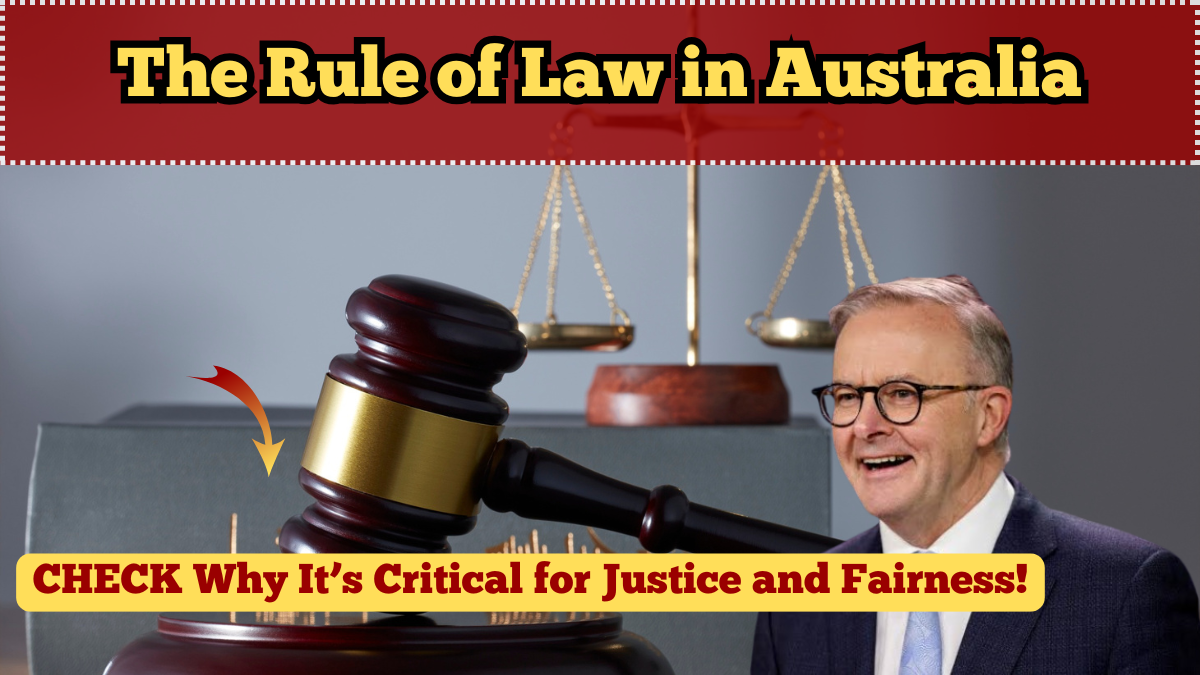In 2025, the principle of the rule of law continues to be a cornerstone of Australian democracy. This foundational value ensures that all individuals—regardless of status, wealth, or position—are subject to the same set of rules. At its core, the rule of law meaning reflects fairness, accountability, and transparency in governance. For citizens, this principle provides protection against the arbitrary use of power and strengthens trust in the australian legal system.
Understanding the rule of law in Australia is essential for anyone who wishes to comprehend how the country operates—not just politically, but socially and economically as well. In this article, we’ll break down what the rule of law means, why it matters in 2025, and how it’s enforced through legal institutions and democratic structures.

What Is the Rule of Law Meaning in Australia?
The rule of law meaning can be described simply: everyone is equal before the law, and no one is above it—not even the government. This concept guarantees that:
-
Laws are publicly known, clear, and stable
-
Legal rights and duties apply equally to all individuals
-
Government authority is exercised in accordance with the law
-
Independent courts ensure fair adjudication
In Australia, this concept is not just a political ideal—it is embedded into the Constitution, upheld by the judiciary, and practiced through the legal system at every level. It ensures that laws must be passed through democratic processes and applied consistently across all sectors of society.
How the Australian Legal System Upholds the Rule of Law
The australian legal system plays a central role in upholding the rule of law. This is achieved through various branches of government and legal institutions working together:
-
Parliament creates the laws in line with constitutional provisions
-
Executive bodies implement these laws, including police and regulatory agencies
-
The judiciary interprets and applies the laws, ensuring justice is served impartially
Key features of the Australian system that reinforce the rule of law meaning include:
-
Separation of powers between the legislature, executive, and judiciary
-
Judicial independence, meaning courts are free from political influence
-
Access to legal representation to ensure fair trials
-
Appeal systems that allow for legal errors to be reviewed and corrected
This structure guarantees legal consistency while providing checks and balances that safeguard citizens’ rights.
Real-Life Examples of the Rule of Law in Action
To better understand how the rule of law in Australia operates in real life, consider these situations:
-
Case of Robodebt (2020–2023): The unlawful automated debt recovery scheme was struck down by the courts, reaffirming the need for legal accountability, especially when the government oversteps.
-
High Court ruling on Indigenous rights (2020): The court held that Aboriginal Australians could not be considered “aliens” under immigration law, reaffirming protections under both common law and human rights principles.
-
Corporate prosecutions under ASIC (Australian Securities and Investments Commission): Holding large corporations and CEOs accountable for insider trading, fraud, or market manipulation reflects that even powerful entities are not above the law.
These examples show how the australian legal system remains committed to fairness and justice across all sectors—government, individual, and corporate.
Why the Rule of Law Matters in 2025
In the modern digital age, threats to personal freedoms, privacy, and democratic processes are evolving. This makes the rule of law in Australia more important than ever. In 2025, it plays a key role in:
-
Combating misinformation and upholding free speech without inciting harm
-
Protecting against unjust surveillance or data collection
-
Ensuring fair legal recourse in disputes related to AI, technology, and digital rights
-
Maintaining trust in elections, political systems, and institutional processes
As Australia embraces change in technology, health, and global relations, the strength of the rule of law meaning ensures that human rights remain protected and government power is exercised justly.
How Citizens Can Support and Benefit from the Rule of Law
The rule of law isn’t just a legal principle enforced from the top—it’s something every citizen benefits from and helps uphold. Here’s how individuals can engage with and support this pillar of democracy:
-
Stay informed about changes in legislation
-
Participate in public consultations on new laws and policies
-
Access legal support services when facing legal issues
-
Respect the decisions of courts, even when they challenge popular opinion
-
Hold leaders accountable through voting and democratic participation
A strong and transparent legal system requires active engagement from the public. It’s not just about protecting rights—it’s about empowering people to live with dignity and justice.
FAQs
What does the rule of law mean in simple terms?
It means that everyone, including the government, must follow the law and be held equally accountable under it.
How is the rule of law protected in Australia?
It is protected through the Constitution, an independent judiciary, democratic institutions, and laws that ensure transparency and accountability.
Can the government be punished under the rule of law?
Yes. The government can be challenged in court and held accountable when its actions violate legal principles or constitutional rights.
Why is the rule of law important for democracy?
It protects individual rights, ensures fairness, and limits the abuse of power—key foundations of a functioning democracy.
Does the rule of law apply to private corporations too?
Absolutely. All private individuals and businesses, regardless of size or wealth, must obey the law and can be prosecuted for violations.
Click here to know more.
Aanchal is a passionate writer with a keen interest in storytelling, content creation, and creative expression. She enjoys exploring diverse topics and crafting engaging narratives that captivate readers.




